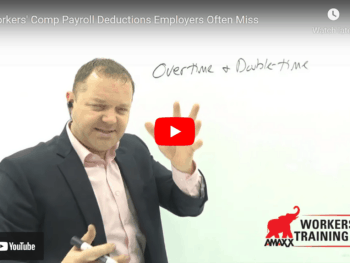Estimating payroll is an all-important feature of workers’ comp insurance as your premium payment is pegged to figures. Part of the audit process determines whether an employer’s payroll figures were accurate. If you under-estimated, there are additional premiums to pay. On the other hand, if you over-estimate, you may receive a refund. However, it’s better to estimate payroll figures as close to actual figures as possible.
One of the “tricks” and somewhat confusing is the issue of adjustments. Adjustments are used to add and subtract from the gross payroll for employees. Remembering that each state has its own rules for premium development, the auditor must be familiar with the rules in each state where every employee works in and how each state applies these rules during the policy period.
Insurance audits always start with total earnings and then make adjustments as needed to come to the correct final exposure for each state. So, it’s important to make adjustments correctly. The current rules for developing taxable total earnings for employees normally include virtually all payrolls and substitutes for payroll for employees so the adjustment rules for deductions in each state are the most common adjustments done.
Click Link to Access Free PDF Download
“Workers’ Comp Claims Review Checklist: 9 Must-Have, Serious-Impact Elements”
Remember , normally total earnings = Medicare wages + Section 129 deductions + Section 125 deductions. Using wages that agree with this formula normally produce the correct total earnings for the policy period.
The Most Common Adjustments
- Pretax deductions, also known as section ,125/129 deductions are deducted from the premium base in California ONLY. Other states include section 125 in premium base. California employers should be sure to have this information summarized so it can be deducted from the exposure totals for their policy.
- Tips paid are a form of third party pay and is excludable from the premium base in many states. Remember tips and service charges are different – tips are paid directly to employees by customers, where service charges are paid to the employer. Only tips can be excluded.
- Severance paid is excludable from the premium base in many states .
- Overtime dollars paid are excludable from the premium base in many states
- Value of Group term life over $50,000 are IRS imputed income and excludable from the premium base in many states.
- Fringe benefits that are IRS imputed income, such as personal use of an auto, are excludable from the premium base in many states.
- 3rd party sick pay is excludable from the premium base in many states, because the payments are made directly from the 3rd party payer to the employee – the employer does not make these payments, although in some cases they are included in the employers’ records. If included in the gross wages, these can be deducted.
- Reimbursed expenses shown in income with actual records of the expense submitted is excludable from the premium base in many states. IRS rules often require including certain expenses the insurance industry does not include, so let the auditor know about such reimbursements so allowable deductions can be excluded.
- Military pay is excludable from the premium base in many states, so if you continue to pay employees who are in the service document these payments so the auditor can review them.
- Stock options are excludable from the premium base in many states.
- Holiday/vacation/sick pay are excludable from the premium base in some states such as Kansas, as long as actual amounts are documented for specific pay that is vacation pay.
- Residuals from commercials and motion pictures can be excluded in most states.
- Expense reimbursements reported as income is excludable from the premium base in many states.
- Stock bonuses are included in the premium base in many states, so if these amounts are available the auditor can review them.
As you see , there are many different rules in each of the 50 states offering some significant opportunities to reduce your workers’ compensation premiums. Work very closely with your auditor to make your audit as accurate as possible! AND, know your state’s laws – See: http://reduceyourworkerscomp.com/laws_and_regulations.php
We welcome Robert Frenzer as a guest author. Bob has been involved in premium auditing for over 30 years, including experience as an audit director for a regional insurance carrier and regional manager for a large national insurance company. Bob currently serves the industry as President of VISTA Resources, a premium auditing company that assists employers in completing their annual insurance audits. He can be reached at VISTA RESOURCES INC 3030 W Salt Creek Lane Suite 122 Arlington Heights, IL 60005 voice: 847-398-1172 Website: http://www.vistaresource.com
WC Books: http://www.reduceyourworkerscomp.com/workers-comp-books-manuals.php
WC Calculator: http://www.reduceyourworkerscomp.com/calculator.php
Do not use this information without independent verification. All state laws vary. You should consult with your insurance broker or agent about workers’ comp issues.
©2009 Amaxx Risk Solutions, Inc. All rights reserved under International Copyright Law.

























